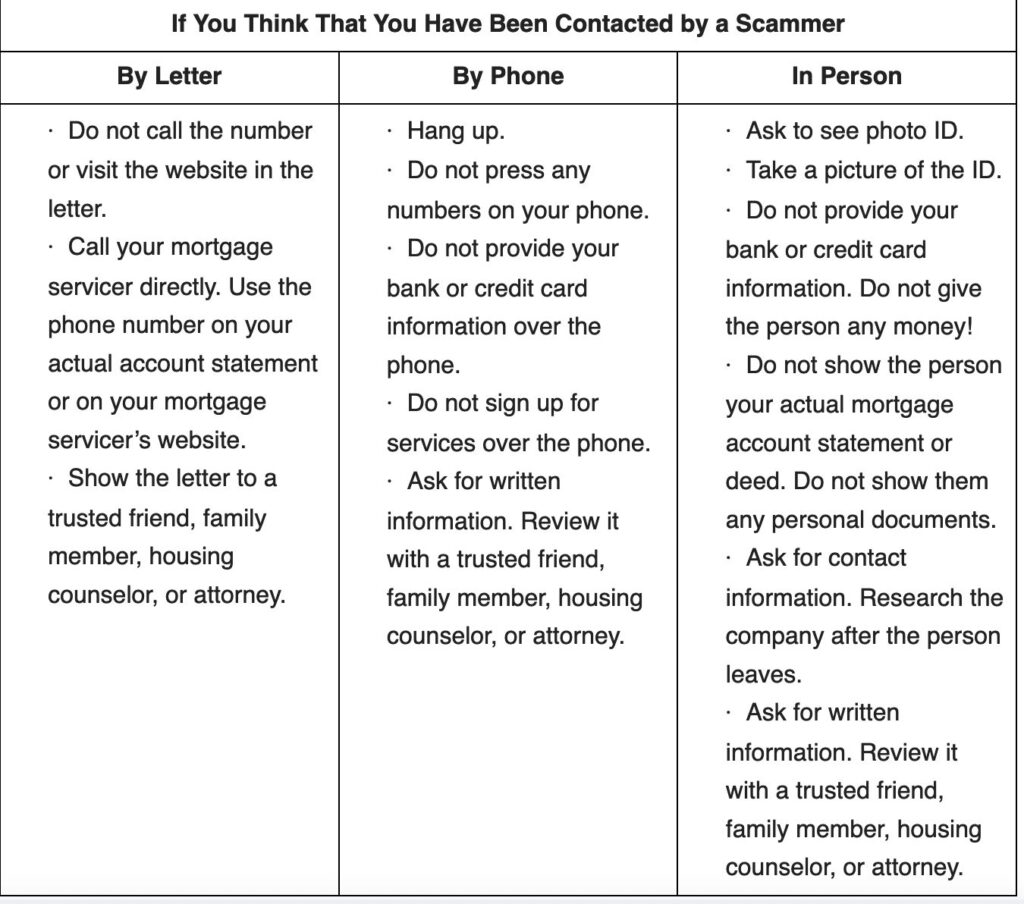
From the office of the DC Attorney General:
“Attorney General Brian L. Schwalb today issued the below consumer alert warning DC residents about common scams that target homeowners, including extremely convincing scams that use real information about your mortgage or even photos of your property.
Consumer Alert: Do You Own a Home in DC? Avoid Scams Targeting Homeowners!
Homeowners are frequent targets of scams. If you own a home in DC, be aware of the warning signs and learn how to protect yourself and your family. Homeowner scams can be extremely convincing. Scammers looking to steal your money or personal information will often lie to you about your mortgage, taxes, or home warranty, and may use information that is related to your actual home, such as the name of your mortgage servicer, your account information, or even photos of your property.
If you or someone you know receives a letter, phone call, or a visit from an in-person “salesperson,” pause before giving up your money or information.
Homeownership scams can take different forms. But there are often three common themes:
1. Pressure to sign over interest in your home;
2. Expensive charges for services before they are provided; and
3. A push to sign up for unnecessary services (like a home warranty).
It’s important to be informed, share this information with others, and know what to do when a mistake happens.
Below are critical tips, examples, and red flags to watch out for to avoid being scammed.
Examples of Common Homeownership Scams
- Lease-Back or Repurchase Scams: The scammer promises to pay off your mortgage or taxes. In exchange, they ask you to “temporarily” give them the deed to your home. The scammer promises to let you stay in the home as a renter or buy the home back when you have the money. However, once you sign away your rights to a property, there is no guarantee you will be able to repurchase it. The new owner may also evict you.
- Refinance Scams: The scammer poses as a mortgage broker or lender. They offer to refinance your loan. They claim documents are refinance documents, but they are actually deed transfer documents. Like the lease-back or repurchase scams, once you sign away your rights to a property, there is no guarantee you will be able to repurchase it. And again, the new owner may evict you.
- Home Warranty Scams: The scammer sends a letter to your home. The letter urges you to call a number to address “time-sensitive” concerns about home warranty plans. The scammer pushes for a payment. They claim you are required to purchase a home warranty plan or that your home warranty plan is about to expire and must be renewed.
-
- A home warranty is different than homeowner’s insurance. A real home warranty plan protects the appliances and systems in your home. It helps pay for repairs or replacement. Homeowner’s insurance is required by most lenders, but a home warranty is not.
- Phantom Help: The scammer claims they are a housing counselor or lawyer. They claim they can help you avoid foreclosure in exchange for large fees. They demand these fees before they provide any services. In the end, they provide minimal or no services, and disappear with your money.
- Property Lien Scam: The scammer mails a letter that threatens you with a tax bill from a fake government agency, like the “Bureau of Tax Enforcement,” which does not exist. The letter may threaten an IRS action that would force you to pay a penalty or lose your home. You pay the “tax bill,” but none of that money goes toward your mortgage or taxes. The scammer makes off with your money.
- Phone and Internet Scams: The scammer pressures you to apply for a loan over the phone or internet. This lets the scammer extract personal and banking information from you. They then use that information to steal your identity.
Red Flags to Watch Out For – Consumer Tips
Scammers use different ways to create a sense of urgency and cause panic. They try to limit your ability to review documents or try to make you feel like you have done something wrong and must act fast to fix it. If this happens to you, whether by letter, over the phone, or in person, someone may be trying to scam you.
Lookout if someone:
- Makes an unsolicited offer to help save your home;
- Uses designs, logos, or names that look or sound like a government agency, but are not;
- Pressures you to act immediately, often to send money, sign documents, or provide personal information like social security numbers or account numbers;
- Recommends you end contact with your lender or counselor;
- Tells you to send your payments to anyone other than your mortgage servicer;
- Advises you to stop making mortgage payments;
- Instructs you to transfer ownership of your property to them;
- Demands a large payment in advance of any services;
- Accepts payments only by cashier’s check, wire transfer, mobile payment app like Zelle, or asks for payment in gift cards;
- Makes promises over the phone or in person only, and never puts anything in writing; or
- Asks you to sign a document that has blank lines or spaces.
Before providing any personal or banking information, keep the following tips in mind:
- Do not panic.
- Call your mortgage servicer.
- Talk to a trusted friend or family member.
- Post on your neighborhood listserv or talk to your neighbors. Ask if they have received the same or similar phone calls or letters. Scams often target the entire community.
- Confirm that the company is real and has a good reputation. Do an internet search of the company. You can use the free SCOUT database to see if the business is licensed or permitted to do business in the District. If the business is not licensed or permitted, do not do business with them!
- Never sign any document that you have not read, that you do not understand, or that has blank spaces or lines.
- Talk to a lawyer if you have any questions. Call the free DC Bar Legal Information Help Line at (202) 626-3499. Lower income individuals may qualify for free legal help.
- Call the free DC Office of the Attorney General Consumer Hotline at (202) 442-9828, or submit a complaint online at https://oag.dc.gov/consumer-
protection/submit-consumer- complaint.

Consumer Resources – Get Free Help!
If you think you have been the victim of a scam, or want to provide a tip about a scam:
- Call OAG’s Consumer Protection Hotline at (202) 442-9828, or submit a complaint to [email protected], or at https://oag.dc.gov/consumer-
protection/submit-consumer- complaint. - File a business complaint with the D.C. Department of Licensing and Consumer Protection.
If you think you are behind on your property taxes, or have received a notice that you are:
- Confirm your tax status by contacting the D.C. Office of Tax and Revenue (OTR) at (202) 727-4829. Or search the OTR online property tax database at mytax.dc.gov.
- If a document claims you are behind on your federal taxes, review your federal tax information and payment options at IRS.gov or call the Internal Revenue Service (IRS) at (800) 829-1040.
If you are having trouble paying your mortgage or have received a foreclosure notice:
- Contact your mortgage servicer immediately. Only your servicer can adjust your loan agreement. You may be able to negotiate a new plan to avoid foreclosure.
- Read foreclosure prevention resources on the D.C. Department of Housing and Community Development website.
- Work with a non-profit in your community that provides free or low-cost housing help. They can help with foreclosure. They can also help you understand your rights and responsibilities.
- Certified U.S. Department of Housing and Urban Development (HUD) counselors are available 24/7 at the HOPE Hotline (888) 995-4673 for free and private foreclosure help.”
Recent Stories

We’re about a month out from summer. That means you’ve still got time for spring cleaning!
Lexi Grant, an operations manager at Well-Paid Maids, shared her go-to spring cleaning tips with WTOP News. Step one? Declutter. Get rid of items you don’t use, find space for items that need a home and organize those areas.
Then, it’s time to dust. Lexi starts with high-touch surface areas (think: refrigerator, dishwasher, counters, microwave). One area she sees often neglected is the bedroom — and it makes sense. Heavy furniture is difficult to move around, but it’s important to really get in there so dust doesn’t affect your sleep.

In Commemoration of the 100th Anniversary of the Passing of Giacomo Puccini
The Washington Opera Society Presents
Giacomo Puccini’s “La Fanciulla del West”
Featuring: Jonathan Burton, Michael Butler, Kristin Sampson, Kevin Short, with Adam Cioffari, Andrew Boivert, Peter Burroughs, Collin Power, Josh Bates, Carl Rosenthal, Jude Regan, Jose Sacin, Solomon Collins, Anamer Castrello, Noah Mond, and Maestro Julian Benichou conducting the Chorus & Orchestra of the Washington Opera Society.
Baker Meet Up: Baking With Local Rye
Calling all home bakers and professional bakers alike! CGA is hosting its next Baker Meet Up on Monday, June 3 from 6-8 p.m. at the University of the District of Columbia. This time around, we’re focusing on baking with local
Beyond Boundaries: An Evening Curated by Annabelle Lopez Ochoa
May 22-25 at 8pm
May 25-26 at 2pm
Internationally acclaimed choreographer Annabelle Lopez Ochoa curates a special evening, including her lauded 2019 TWB commission, Delusional Beauty. Works from emerging choreographers, Chanel Da Silva and Houston Thomas will elevate diverse voices







